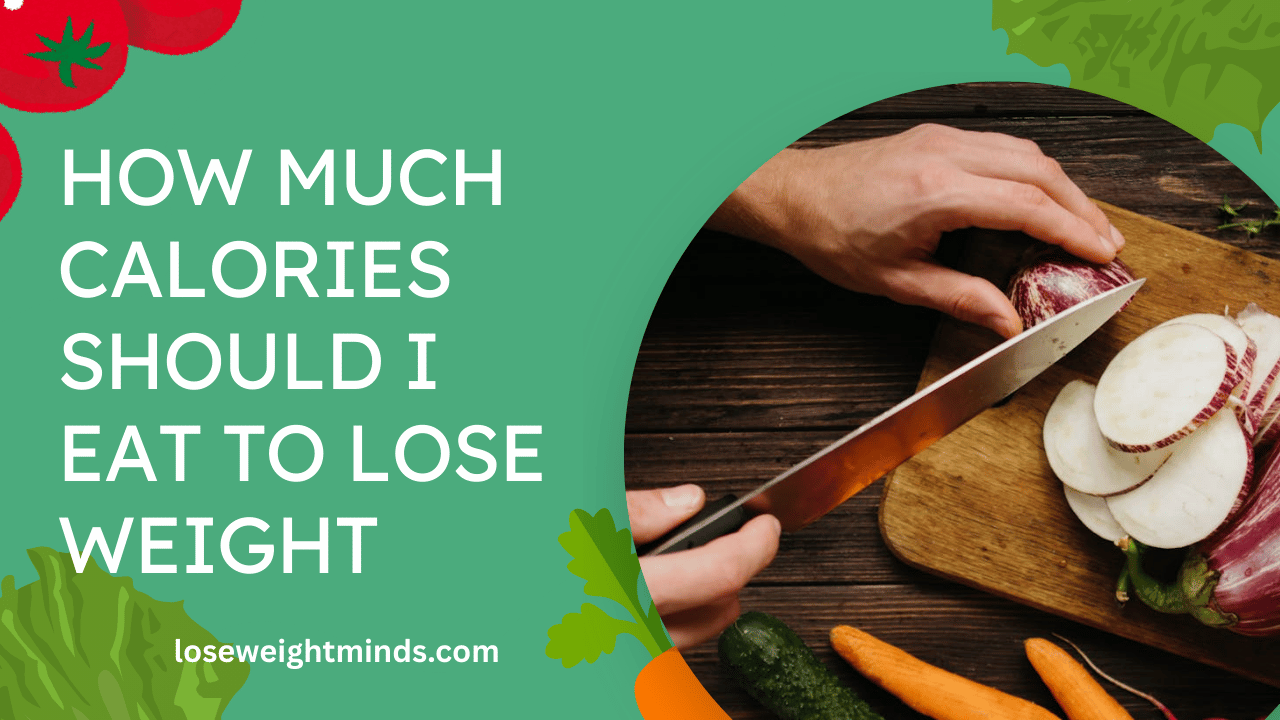Embarking on a weight loss journey involves a fundamental understanding of caloric intake versus caloric expenditure. A persistent question on the minds of those looking to shed pounds is: “How much calories should I eat to lose weight?” The answer isn’t a one-size-fits-all approach; it requires consideration of various personal factors. In this article, we’ll explore the science of calories, how to calculate your needs, and effective strategies for achieving your weight loss goals.

Understanding Calories and Weight Loss
At its core, weight loss occurs when you burn more calories than you consume, creating a caloric deficit. This deficit prompts your body to utilize stored fat for energy, leading to weight loss. However, the balance is delicate; consuming too few calories can lead to nutrient deficiencies, metabolic slowdown, and other health issues.
What is a Calorie?
A calorie is a unit of measurement for energy. In nutrition, it specifically refers to the energy provided by food and beverages, which your body converts into energy for daily activities. Not all calories are created equal; the quality of food influences metabolic health, satiety, and overall well-being.
The Importance of Caloric Deficit
To understand how many calories you should eat to lose weight, you need to first understand your Total Daily Energy Expenditure (TDEE). This is the total number of calories your body burns in a day, accounting for:
- Basal Metabolic Rate (BMR): The calories your body needs at rest to maintain basic physiological functions such as breathing, circulation, and cellular production.
- Physical Activity Level (PAL): Calories burned through physical activity, including exercise, walking, and daily chores.
- Thermic Effect of Food (TEF): The energy required to digest, absorb, and metabolize food.
Calculating Your Caloric Needs
Step 1: Determine Your BMR
Your BMR can be estimated using various equations, with the Mifflin-St Jeor Equation being one of the most commonly used:
- For men: BMR = (10 × weight in kg) + (6.25 × height in cm) – (5 × age in years) + 5
- For women: BMR = (10 × weight in kg) + (6.25 × height in cm) – (5 × age in years) – 161
Step 2: Calculate Your TDEE
To find your TDEE, multiply your BMR by an activity multiplier based on your lifestyle:
- Sedentary (little or no exercise): BMR × 1.2
- Lightly active (light exercise/sports 1-3 days/week): BMR × 1.375
- Moderately active (moderate exercise/sports 3-5 days/week): BMR × 1.55
- Very active (hard exercise/sports 6-7 days a week): BMR × 1.725
- Super active (very hard exercise, physical job, or training twice a day): BMR × 1.9
Step 3: Establish a Caloric Deficit
To lose weight, you’ll need to create a caloric deficit. A common recommendation is to aim for a deficit of 500 to 1000 calories per day, leading to a steady weight loss of about 1 to 2 pounds per week, which is considered safe and sustainable.
Example Calculation
Let’s say a 30-year-old woman weighs 160 pounds (72.5 kg) and is 5’5″ (165 cm) tall. She exercises moderately 3-5 times a week.
This woman should aim to consume about 1800 calories a day to achieve her weight loss goals.
Quality Matters: Choosing Nutrient-Dense Foods
While calculating how many calories you should consume is important, the quality of the calories is equally crucial. Focusing on nutrient-dense foods helps ensure you are fueling your body properly while losing weight. Consider including:
- Fruits and Vegetables: High in vitamins, minerals, fiber, and low in calories.
- Whole Grains: Such as brown rice, quinoa, oats, which provide sustained energy.
- Lean Proteins: Chicken, fish, tofu, and legumes help repair tissues and keep you satiated.
- Healthy Fats: Avocados, nuts, olive oil, which are essential for hormonal balance and overall health.
Strategies for Successful Weight Loss
1. Track Your Intake
Using apps or food diaries can help track calories consumed and ensure you meet your daily goals. Tracking can increase awareness of eating habits and help adjust portion sizes.
2. Educate Yourself
Understanding food labels and portion sizes helps in making informed decisions. Knowing how to estimate calories in your meals can reinforce mindfulness.
3. Stay Hydrated
Sometimes, thirst is mistaken for hunger. Drinking enough water can help mitigate unnecessary snacking and support overall health.
4. Get Support
Whether through a weight loss group, a dietitian, or an online community, having a support system can keep you motivated and accountable.
5. Make Adjustments
Weight loss is not always linear. Your body may adapt to lower caloric intake, causing weight loss to plateau. Be prepared to re-evaluate your caloric needs as you lose weight and adjust your intake or activity level accordingly.
6. Prioritize Sleep and Stress Management
Poor sleep and high-stress levels can interfere with weight loss. Prioritize quality sleep and consider techniques like meditation or yoga to manage stress, which can help regulate hormones that affect appetite.
The Pitfalls of Extreme Calorie Restriction
It’s important to recognize the dangers of excessively restricting caloric intake. While drastic diets may show quick results, they often lead to muscle loss, nutritional deficiencies, and eventual weight regain. Furthermore, overly restrictive diets can create an unhealthy relationship with food, leading to binge eating or disordered eating behaviors.
Sustainable Changes Over Quick Fixes
Aim for gradual and sustainable changes. Healthy weight loss is not just about numbers on a scale; it’s about creating a lifestyle that promotes overall well-being. By focusing on balanced meals, regular physical activity, and a positive mindset, you’re more likely to achieve lasting results.
Conclusion
Determining how many calories to eat for weight loss involves understanding your individual caloric needs, establishing a healthy deficit, and focusing on the quality of your nutrition. While the journey may come with challenges, informed strategies for tracking intake, choosing nutrient-dense foods, and adopting holistic health practices will empower you to achieve and maintain your weight loss goals. Remember, successful weight loss is a marathon, not a sprint; your commitment to the journey is what will ultimately lead to a healthier, happier you.


